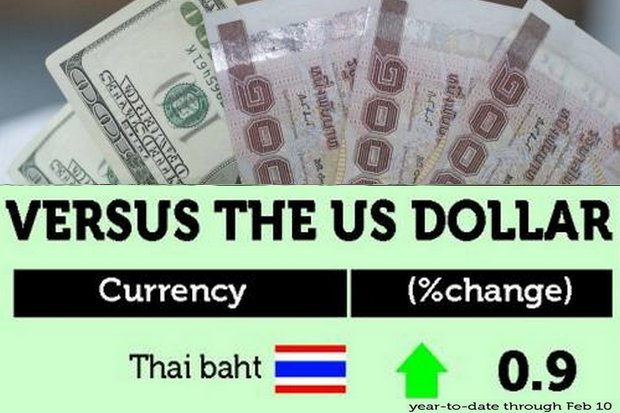
Despite concerns about adverse effects on exports from the strong baht, the Bank of Thailand insists no special measure will be taken to manage foreign exchange in light of the baht's relative stability and regular fund flows.
Pongpen Ruengvirayudh, the deputy governor overseeing monetary stability, said there had been no speculative fund flows into Thailand, so implementing any extra measure on foreign exchange management was not yet necessary.
"[Capital] flows remain normal, but [the value of] foreign exchange for certain [major] currencies compared with the US dollar has changed dramatically, thus affecting a drastic move [in the value of] those currencies compared with the baht," she said.
"When we talk about measures to curb [capital inflows], irregularity has to occur, and those measures would be aimed at reducing or eliminating that anomaly, but were not seeing those kind of flows at the moment, so implementing those measures is not the answer."

In fact, the baht has been more stable than other currencies, with its volatility decreasing to 3% from 5-6%, Mrs Pongpen said.
She said the central bank on Wednesday held discussions with representatives from the Thai Chamber of Commerce (TCC), where a mutual understanding was reached.
Mrs Pongpen said the central bank was ready to use available tools to manage the baht for the benefit of the private sector, but limitations in its instruments to manage foreign exchange effectively in the medium term needed to be considered.
"The private sector also has to adapt to mitigate changes in exports and foreign exchange amid weakening global demand," she said.
TCC vice-chairman Vichai Assarasakorn said Wednesday's discussions focused on seeking tools to support the business sector, especially border trade, as well as on some rules that obstruct the flow of trade and should be relaxed.
TCC chairman Isara Vongkusolkit said representatives had given information to the central bank on how manufacturers had been affected by currency volatility since last year so that the bank could analyse the foreign exchange rate or find ways to eliminate barriers to long-term trade.
He said the baht had fluctuated recently mainly due to monetary stimulus measures in the euro zone and Japan, tumbling oil prices and falling farm product prices.
The central bank should support the establishment of commercial bank branches in emerging economies, Mr Isara said.